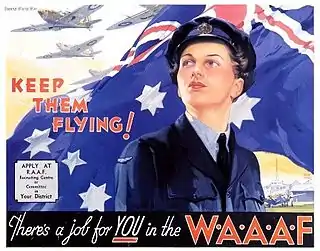Women's Auxiliary Australian Air Force
The Women's Auxiliary Australian Air Force (WAAAF) was formed in March 1941, after considerable lobbying by women keen to serve and by the Chief of the Air Staff, who wanted to release male personnel serving in Australia for service overseas. The WAAAF was the first and largest of the wartime Australian women's services. It was disbanded in December 1947.[1]
| Women's Auxiliary Australian Air Force | |
|---|---|
 WAAAF recruiting poster | |
| Active | 1941–47 |
| Country | Australia |
| Branch | Royal Australian Air Force |
| Type | Women's service |
| Engagements | World War II |
| Commanders | |
| Notable commanders | Mary Bell (1941) Clare Stevenson (1941–46) |
History
.jpg.webp)
Not long after World War II was declared in 1939, the Royal Australian Air Force had an urgent need for more skilled and semi-skilled signals and maintenance personnel to fulfil its wartime commitments to the Empire Air Training Scheme (EATS) for local defence in Australia.
On 4 February 1941, the formation of an air force women's auxiliary was approved by the War Cabinet. It had taken 14 months of difficult discussion and opposition to achieve this final outcome.
The formation of the Women's Auxiliary Australian Air Force (WAAAF) set a precedent for the formation of other women's service organisations such as The Australian Women's Army Service (AWAS) and the Women's Royal Australian Naval Service (WRANS).
Approximately 27,000 women enlisted in the WAAAF between 15 March 1941 and 24 August 1945. In June 1941, Squadron Officer Clare Stevenson was appointed Director of the WAAAF.[1] She took over from Flight Officer Mary Bell, wife of an RAAF group captain and former Australian Commandant of the volunteer Women's Air Training Corps, who had held temporary command for the first three months of the WAAAF's existence.[2]
References
- "Women in Air Force". Royal Australian Air Force. Archived from the original on 20 July 2008. Retrieved 10 April 2016.
- Gillison, Douglas (1962). "Chapter 5 – The New Command" (PDF). Australia in the War of 1939–1945: Series Three – Air. Volume I – Royal Australian Air Force 1939–1942. Canberra, ACT: Australian War Memorial. pp. 99–100. OCLC 2000369.